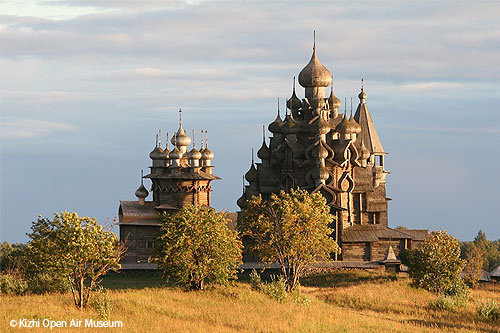COURSE ANNOUNCEMENT
 Dates: 11 – 30 September 2017 (arrival date 10 September, departure date 1 October)
Dates: 11 – 30 September 2017 (arrival date 10 September, departure date 1 October)
Location: Kizhi Island (11 days) and Petrozavodsk (10 days), Republic of Karelia, Russian Federation
Chief organizer:
Partners:
- ICCROM
- Petrozavodsk State University and UNESCO Chair of Wooden Architecture Research and Preservation
- Ministry of Culture of the Republic of Karelia
- Ministry of Culture of the Russian Federation
Background and aims:
Wooden architecture comprises a vital part of the world’s historical and cultural heritage. The fact that several countries have inscribed their wooden monuments on UNESCO World Heritage List is a testament to its importance. However, these monuments are also very fragile and vulnerable.
The conservation of wooden monuments should be carried out in tandem with the preservation of traditional carpentry techniques and use of traditional tools. At the same time, professionals in wooden architectural conservation should also know the latest preservation and restoration techniques, work with leading experts in the field of wooden architectural conservation, and study international experiences.
 The Russian North is a treasury of wooden architecture. More than 1 300 wooden monuments have been preserved on the territory of the Republic of Karelia alone. A unique tradition of vernacular wood construction has been highly developed and preserved there, and rich experience in wooden architectural conservation has been gathered.
The Russian North is a treasury of wooden architecture. More than 1 300 wooden monuments have been preserved on the territory of the Republic of Karelia alone. A unique tradition of vernacular wood construction has been highly developed and preserved there, and rich experience in wooden architectural conservation has been gathered.
The main part of the course on “Wooden architecture conservation and restoration” will be held in the largest open air museum of Russia, the Kizhi museum, whose collection includes 83 wooden architectural monuments. The mainstay of the museum collection is the UNESCO World Heritage Site of Kizhi Pogost. Currently, the Kizhi Open Air Museum is carrying out the restoration of the Church of the Transfiguration, built in 1714. This work is being carried out with the help of unique technologies that have been customized according to the complicated configuration of the structure. The exceptional quality of the restoration works has been acknowledged by ICOMOS and UNESCO international experts, who have recommended that this experience be shared with a wider audience in Russia and the world.
This course will include other study visits to wooden architecture sites in Karelia, as well as lectures and practical sessions that place emphasis on traditional carpentry techniques.
Course goal and objectives:
 The overall goal of this course is to improve professional knowledge and prepare the participants for the practical work of preserving wooden architectural monuments in their countries. In particular, the objectives are to:
The overall goal of this course is to improve professional knowledge and prepare the participants for the practical work of preserving wooden architectural monuments in their countries. In particular, the objectives are to:
- introduce the features of Russian wooden architecture and carpentry traditions
- train wooden architecture monitoring and maintenance techniques
- provide knowledge and practical skills for traditional and modern wooden architecture restoration techniques.
Methodology:
The course is an intensive program that combines theoretical and practical sessions, as well as participation in the restoration projects underway at the Kizhi Open Air Museum. There will also be visits to the most interesting wooden architectural monuments in Karelia.
Participant profile:
 The course is for professionals in the field of wooden architectural conservation and restoration who have at least 3 years of practical experience. Specialized education is desirable.
The course is for professionals in the field of wooden architectural conservation and restoration who have at least 3 years of practical experience. Specialized education is desirable.
Teaching team:
Classes will be conducted by experts of the Kizhi museum. In addition, professionals coming from educational, scientific and restoration organizations in Russia and elsewhere will lend their expertise in the area of wooden architectural monitoring, conservation and restoration.
Working languages: English, Russian
Certificate:
- Participants will receive certificates of completion.
- The total course programme consists of 144 hours (4 ECTS), including practical and theoretical classes, presentations of the programme participants, independent work with educational materials and preparation for a final exam. A written test is held in the end of the course. In case of successful completion of the test, a participant is entitled to four credits in accordance with the university program of the additional professional education.
Students may be admitted to the exam and awarded with certificates only if they attended all the classes.
Course fee:
 30 000 rubles. The course fee includes training as well as all program transfers.
30 000 rubles. The course fee includes training as well as all program transfers.
Additional expenses:
- travel expenses to and from Petrozavodsk
- accommodation expenses in Petrozavodsk and Kizhi island
- meal expenses.
For details, please contact the course coordinators.
Applications:
Please fill out the application form and send it by email to international@kizhi.karelia.ru .
The application must be accompanied by the following documentation:
Professional curriculum vitae showing all relevant data.
Cover letter describing course significance and relevance for the applicant.
Application deadline: 10 May 2017 (4 months before the course start date)
Contacts:
We welcome all questions by email.
Letters concerning organizational issues should be sent in English or Russian to the following address: international@kizhi.karelia.ru
Contact persons – Olga Titova, Ksenia Kuznetsova
Appendices:
Preliminary program for the ICCROM course “Wooden architecture conservation and restoration”
SEE ALSO:
Kizhi State Open Air Museum of History, Architecture and Ethnography
